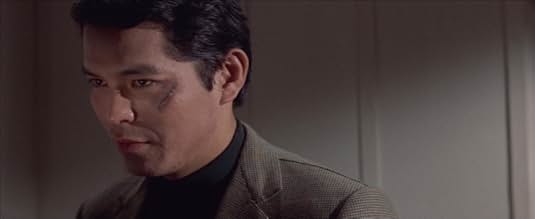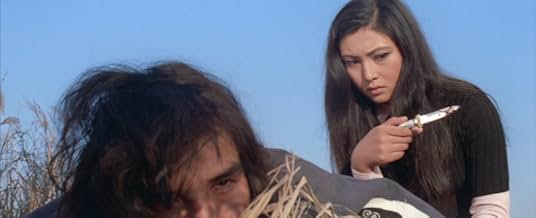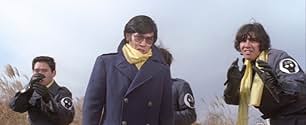Adicionar um enredo no seu idiomaThe series swansong, Beat '71, sees Kaji framed and sent to prison by her boyfriend's father and with the help of some hippies she strives to be re-united.The series swansong, Beat '71, sees Kaji framed and sent to prison by her boyfriend's father and with the help of some hippies she strives to be re-united.The series swansong, Beat '71, sees Kaji framed and sent to prison by her boyfriend's father and with the help of some hippies she strives to be re-united.
- Direção
- Roteiristas
- Elenco e equipe completos
- Produção, bilheteria e muito mais no IMDbPro
Enredo
Você sabia?
- CuriosidadesNORA NEKO ROKKU: NEK ROKKU series. #5 and final in series.
- ConexõesFollows Nora-neko rokku: Onna banchô (1970)
Avaliação em destaque
Toshiya Fujita returns to the director's seat for Beat '71, the fifth and final film in the Stray Cat Rock series. Like his earlier entry, Wild Jumbo, it's a more light-hearted affair than any of Yasuharu Hasebe's efforts, and as such lacks the 'cool' factor that I look for in my Japanese '70s cinema. Also, the series' star, Meiko Kaji, plays second fiddle to a group of free-spirited hippies, her character spending much of the film locked in a cell by the film's bad guy. It's a disappointing way to end a series that, as a whole, really isn't as worthy of cult-dom as Kaji's Female Prisoner Scorpion films or her Lady Snowblood movies.
Kaji plays hippy Furiko, whose romantic liason with fellow drop-out Ryumei is interrupted by a gang of thugs, who have been ordered by Ryumei's businessman father Yoshitarô Araki (Yoshio Inaba) to bring his son home. A fight breaks out, during which Ryumei kills one of Akari's hired heavies; Ryumei is then bundled into a car by two of Akari's henchmen, with Furiko framed for the murder.
Two months later, Furiko escapes from a women's remand centre, and goes in search of Ryumei. Unfortunately, Ryumei's father has reconditioned his son using brutal beatings, and he is no longer interested in her (it would take more than a few wallops with a bamboo stick to put me off Kaji). Realising that Furiko could be problematic to his political career, Mr. Araki has her abducted and plans to get rid of her before she can tell the truth about his son. Of course, Furiko's hippy friends aren't about to let that happen, and the mounting tensions ultimately results in a typical Stray Cat Rock downbeat ending, set at a disused mine called Gold Town.
If you enjoyed Wild Jumbo's humorous approach, then there's a good chance you'll like this one as well, but if Hasebe's style is more your bag, then Beat '71 might seem a little tepid in comparison. The action is definitely a little too playful for my liking, the frivolous mood typified by a 'WTF?' scene in which one of the drop-outs dies of pleasure while using a pneumatic drill, and the appearance of a band called The Mops, who turn up outside Araki's house to perform a psychedelic rock number, before driving off on their truck. 'Who were they?' asks one of the hippies. 'No idea', another answers. Me neither!
4.5/10, rounded down to 4 for that annoying little kid. Gack!
Kaji plays hippy Furiko, whose romantic liason with fellow drop-out Ryumei is interrupted by a gang of thugs, who have been ordered by Ryumei's businessman father Yoshitarô Araki (Yoshio Inaba) to bring his son home. A fight breaks out, during which Ryumei kills one of Akari's hired heavies; Ryumei is then bundled into a car by two of Akari's henchmen, with Furiko framed for the murder.
Two months later, Furiko escapes from a women's remand centre, and goes in search of Ryumei. Unfortunately, Ryumei's father has reconditioned his son using brutal beatings, and he is no longer interested in her (it would take more than a few wallops with a bamboo stick to put me off Kaji). Realising that Furiko could be problematic to his political career, Mr. Araki has her abducted and plans to get rid of her before she can tell the truth about his son. Of course, Furiko's hippy friends aren't about to let that happen, and the mounting tensions ultimately results in a typical Stray Cat Rock downbeat ending, set at a disused mine called Gold Town.
If you enjoyed Wild Jumbo's humorous approach, then there's a good chance you'll like this one as well, but if Hasebe's style is more your bag, then Beat '71 might seem a little tepid in comparison. The action is definitely a little too playful for my liking, the frivolous mood typified by a 'WTF?' scene in which one of the drop-outs dies of pleasure while using a pneumatic drill, and the appearance of a band called The Mops, who turn up outside Araki's house to perform a psychedelic rock number, before driving off on their truck. 'Who were they?' asks one of the hippies. 'No idea', another answers. Me neither!
4.5/10, rounded down to 4 for that annoying little kid. Gack!
- BA_Harrison
- 27 de ago. de 2020
- Link permanente
Principais escolhas
Faça login para avaliar e ver a lista de recomendações personalizadas
Detalhes
- Data de lançamento
- País de origem
- Central de atendimento oficial
- Idioma
- Também conhecido como
- Stray Cat Rock: Beat '71
- Empresas de produção
- Consulte mais créditos da empresa na IMDbPro
- Tempo de duração1 hora 26 minutos
- Mixagem de som
- Proporção
- 2.35 : 1
Contribua para esta página
Sugerir uma alteração ou adicionar conteúdo ausente

Principal brecha
By what name was Nora-neko rokku: Bôsô shûdan '71 (1971) officially released in Canada in English?
Responda




























